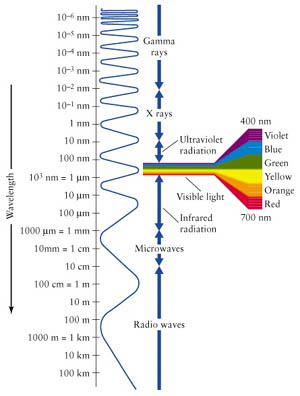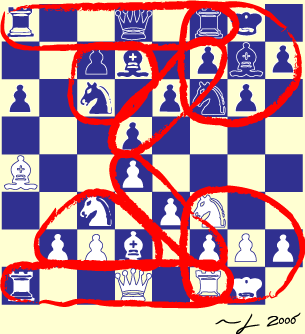“For now we see through a glass, darkly…”
– 1 Corinthians 13:12
There is a common theme among religions of the world: humans are flawed. We are subject to a cycle of suffering, guilty of original sin, or afflicted with a modern malaise of dissatisfaction, which may only be cured through adherence to Buddhism, accepting Jesus Christ as our lord and savior, or following the Sastras. If we fail to follow the official path, we are damned to misery of some form or another.
Science also recognizes the flaws in human beings, chiefly our stunted natural perceptions of the world around us. We don’t see that the solid world around us is made up of atoms that are mostly empty space because there was no evolutionary advantage to perceiving this fact. Optical illusions can distort our perspectives because our brains try to predict the way the world should be, rather than simply accept things as they are. As with religion, science purports to have the solution to such shortcomings as well.
 Wavelengths for colors Credit: NASA |
The visible spectrum, the range of light frequencies we can see with our eyes (ROY G BIV), is an itsy-bitsy subset of the possible frequencies in the electromagnetic spectrum. While we can see wavelengths from 380 to 750nm, the entire spectrum runs from 1 pm up to 100 Mm. We see ROY G BIV, but we don’t see radio, microwave, far and near infrared, ultraviolet, x-rays, gamma rays, or high energy gamma rays. At best, we must indirectly perceive these frequencies using the scientific innovations such as radios, night vision goggles, Geiger counters and other inventions.
The human senses of smell and taste are examples of chemoreception, where chemical signals are converted into stimuli. Receptors in our noses are triggered by molecules in the air and receptors in our tongues are triggered by molecules in what we eat. Humans have approximately 800 olfactory receptor genes, while mice have 1,400. There are more ways to combine molecules than there are atoms in the universe, so it’s easy to understand how limited our senses are in differentiating molecules, however the magnitude of how stunted our senses are is difficult to comprehend. Thank the Cosmos we have chemistry, through which we may detect the mercury, arsenic, and other toxins we cannot taste; spectral analysis, which reveals the elemental content of stars; or biochemistry modeling the molecular processes of life.
 Chunking in Short-Term Memory Credit: Python Software Foundation |
Human working memory can only hold about seven elements at time for a mere 18 seconds on average. When we are given a set of things, say {“blue”, “robot”, “mirror”, “a-flat”, “time”, “42”, “warm”, “E.O. Wilson”}, the overwhelming majority of us will fail to commit at least one of the items to memory. If this last is unconvincing, take a moment to try and memorize pi to one-million digits in order to understand the scope of the world around us and how little of it we can hold in our minds at any one time. One way we overcome this imprecision is through the discipline of computer science, where we may store everything we know about the world, and even generate new information from algorithms that do the inference for us.
Human long-term memory is incredible fallible. Our brains are not video cameras, recording things as they happen, but rather they recreate events in our minds in a biased and inaccurate manner, often giving false positives where a suggestion from someone causes us to remember something that did not actually happen. Eyewitness accounts can often be wrong, with victims identifying the wrong person in a line-up, but science has identified this problem and provides us with DNA testing, photography, recordings, citations, the peer-review process, archaeology, and psychology to compensate, so that we may discover even our own personal pasts the way they actually happened.
Science gives us infrared cameras that we may see in the dark, computers so that we may calculate the incalculable, writing and recording that we may revisit the past as it actually happened, chemical analysis, spectral analysis, medical diagnoses, telescopes, electric lights–Of course, without science, we would also be completely unaware of how incredibly stunted is our ability to perceive the world, but anyone who would like to give it up, return to life without antibiotics, modern agriculture, air conditioning, television, and a future where knowledge will continue to grow, along with the enhancements it will bring to our lives, is welcome to drop out of civilization anytime.
Comments
One response to “The Human Flaw That Science Heals”